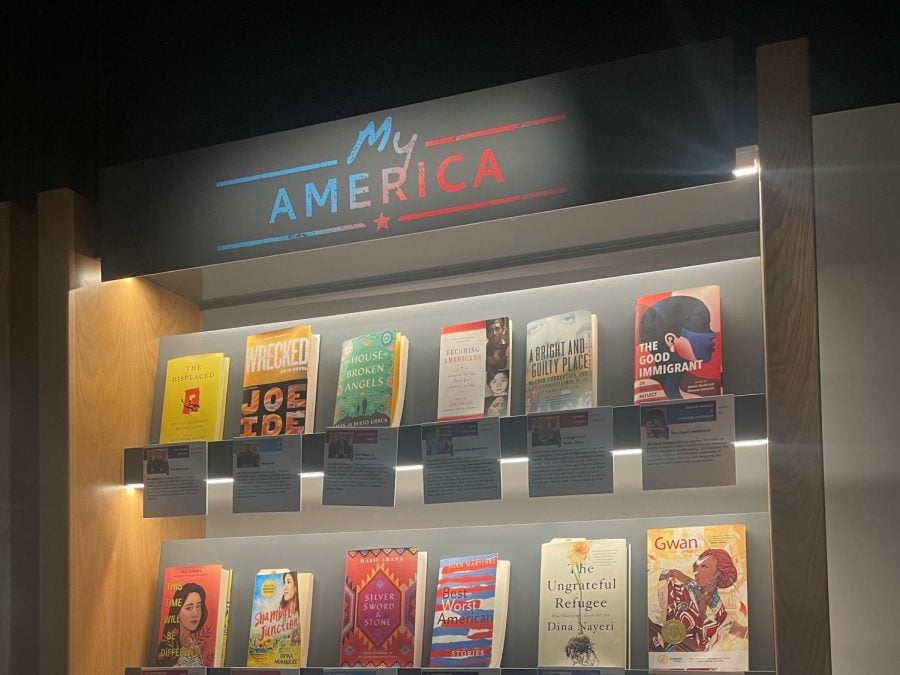A look at Northwestern and Chicago’s rich literary culture
Andrés Buenahora/The Daily Northwestern
The “My America” exhibit at the American Writers Museum highlights the importance of immigrant and refugee stories.
May 24, 2022
The American Writers Festival took place at the American Writers Museum and Chicago Cultural Center on May 15. This inaugural event offered free featured discussion panels, book signings and sessions with more than 75 prominent writers — including members of Chicago’s thriving literary culture.
Author of “We Can’t Breathe: On Black Lives, White Lies, and the Art of Survival” Jabari Asim, National Book Award for General Nonfiction Winner Maxine Hong Kingston and Northwestern creative writing Prof. Juan Martinez were among the festival’s authors and speakers.
Seventh-year political science graduate student Kyle Jones attends many of the University’s readings and literary events. He said he’s looking forward to attending the Classics department’s reading of Vergil’s “Aeneid” at the end of this quarter.
“Literature has deep roots in Evanston and Chicago,” Jones said. “People don’t just find their voices here but craft them. The arts here are second to none. They’re international achievements, something every student or affiliate at Northwestern could take pride in.”
Jones said it is important for the NU to host readings with distinguished writers because it promotes scholarship and the University’s core mission of education.
They added that the classics department typically hosts their favorite literary events on campus.
Other recent literary events at NU include Northwestern’s 14th Annual Writers’ Festival and Tara Stringfellow’s reading of “Memphis.”
“I think the value of literature, perhaps in this way, speaks for itself,” Jones said. “Without the people at Northwestern who understand how literature and writing figure into the education of the liberal arts and sciences, we wouldn’t have events like this.”
Martinez said he felt admiration being in the greenroom and on panels with so many writers he respects.
He said both the American Writers Festival and the Northwestern Writers’ Festival felt like a wonderful celebration and a moment of transition amid the pandemic.
“The writers … all had these wonderful, wonderful insights,” Martinez said. ”Which is part of the whole point — it’s to bring outside voices in so that they would come in with new perspectives, new insight, and new approaches to story and poems and essays and memoirs.”
The American Writers Museum was founded in May 2017 and celebrated its fifth anniversary on the day of the festival, according to museum President Carey Cranston. Cranston said it was great to be able to put on the event and commemorate the museum’s anniversary.
Chicago has a rich literary tradition, which Weinberg junior Laurisa Sastoque said she looks forward to exploring.
“I think it’s important to bring various writers together to talk about their experiences and challenges,” Sastoque said. “After the Northwestern Writers’ Festival, I felt motivated to endure the difficulties of writing and continue to produce meaningful work.”
Martinez said although the American Writers Festival only lasted a day, he was grateful for the sense of community it created.
The festival featured a section celebrating immigrant and refugee writers. Many of the speakers discussed timely issues of social justice such as immigration, antisemitism and more.
“The issue of immigration, I think, is still very pressing,” Martinez said. “The ways in which it intersects with this hostility there is toward people of color … that to me feels like a really important part of my writing these days.”
Martinez detailed a story he wrote about a concentration camp in Bogotá, Colombia and emphasized the importance of addressing similar topics through the written word.
Cranston said bringing social justice topics to light is at the core of what writers do.
“The significance of writing is to point out these issues for us because this is a country that was founded on the written word,” Cranston said. “It is our writers who so often change the course of progress in this country by reaching and touching people with their words.”
Email: [email protected]
Twitter: @andresbuena01
Related Stories:
— Alum Tara Stringfellow pulls from her roots in debut novel ‘Memphis’
— Natasha Trethewey discusses her recent book, “Memorial Drive: A Daughter’s Memoir”
— Helicon fosters creativity and community through literature and art


